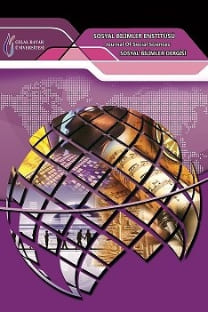The Study of Language and Literature in The Traditional American College (1638-1870)
Amerikan yüksek öğrenimi, geleneksel üniversiteler, klasik üniversiteler, klasikler, klasik retorik, İngilizce retoriği, İngilizce bölümleri, İngiliz edebiyatı, İngilizce dalı
The Study of Language and Literature in The Traditional American College (1638-1870)
American higher education, traditional colleges, classical colleges, classics, classical rhetoric, English rhetoric, English departments, English literature, English major,
___
- BAGG, Lyman Hotchkiss (1871), Four Years at Yale. New Haven: Charles C. Chatfield.
- BECKER, Carl (1943), Cornell University: Founders and Founding. Ithaca: Cornell UP.
- BLAU, Joseph, ed. and introd. (1947), Social Theories of Jacksonian Democracy: Representative Writings of the Period 1825-1850. NY: Liberal Arts Press.
- CAMPBELL, Oscar James (1957), “The Department of English and Comparative Literature.” A History of the Faculty of Philosophy, Columbia University. Introd. J.H. Randall. NY: Columbia UP.
- CHACE, William M. (2009), “The Decline of the English Department.” The American Scholar Autumn 2009. 12 May 2013.
- CHAMBERLAIN, Joshua L. (1901), “Universities of Learning.” University of Pennsylvania: Its History, Influence, Equipment and Characteristic. Boston: R. Herndon.
- CONSER, Walter H. (1933), God and the Natural World: Religion and Science in Antebellum America. Columbia: U of South Carolina P. DEXTER, Franklin Bowditch (1896), Biographical Sketches of the Graduates of Yale College with Annals of the College History, 1745-1763. Vol. 2 NY: Henry Holt.
- DWIGHT, Timothy (1903), Memories of Yale Life and Men, 1845-1897. NY: Dodd, Mead.
- ELLIOTT, Philip (1972), The Sociology of the Professions. London: Macmillan.
- EMERSON, Ralph Waldo (1844), “New England Reformers.” Collected Works of Ralph Waldo Emerson Vol. 3 Joseph Slater et al. (eds.). Cambridge, Mass.: Harvard UP, 1983, pp. 147-167.
- FOSTER, William (1911), Administration of the College Curriculum. Boston: Houghton-Mifflin.
- GURALNICK, Stanley (1975), Science and the Ante-bellum American College. Philadelphia: American Philosophical Society. HALE, Edward E. (1886), “How I Was Educated.” The Forum Vol. 1, pp. 60-61.
- HALL, Thomas Coming (1930), The Religious Background of American Culture. Boston: Little, Brown.
- HAMMOND, William Gardiner (1946), Remembrance of Amherst: An Undergraduate Diary, 1846-48. George F. Whicher (ed.). NY: Columbia UP.
- HARDING, Harold E., introd. (1965), Lectures on Rhetoric and Belles Lettres by Hugh Blair Vol. 1 Facs. rpt. Carbondale/ Edwardsville: Southern Illinois UP.
- HART, James Morgan (1874), German Universities: A Narrative of Personal Experience. NY: Putnam’s.
- HERBST, Jurgen (1965), The German Historical School in American Scholarship: A Study in the Transfer of Culture. Ithaca: Cornell UP.
- HOFSTADTER, Richard (1963), Anti-Intellectualism in American Life. NY: Knopf.
- HUMANITIES RESOURCE CENTER ONLINE, “Indicator II-1.” 12 May 2013.
- IBBOTSON, Joseph Darling (ed.) (1922), Documentary History of Hamilton College. Clinton, NY: Hamilton College.
- JENCKS, Christopher and David Riesman (1968), The Academic Revolution. Garden City, NY: Doubleday.
- KELLEY, Brooks Mather (1974), Yale: A History. New Haven: Yale UP. MARCH, Francis A. (1893), “Recollections of Language Teaching.” PMLA 8, appendix, xix-xxii.
- MATTHEWS, Brander (1917), These Many Years: Recollections of a New Yorker. NY: Charles Scribner’s Sons.
- MORISON, Samuel Eliot (1935), The Founding of Harvard College. Cambridge, Mass.: Harvard UP.
- --- (1936), Harvard College in the Seventeenth Century. Vol. 1 Cambridge, Mass.: Harvard UP.
- NATIONAL CENTER FOR EDUCATIONAL STATISTICS (2012), Digest of Educational Statistics 2011. Washington D.C.: Department of Education.
- New England’s First Fruits in Respect First of the Conversion of some...of the Indians and Second of the progresse of Learning, in the Colledge at Cambridge, in the Massacusets Bay (1643). London: Henry Overton; rpt. NY: Joseph Sabin, 1865.
- POOLE, Joshua (1663), Practical Rhetorick. London, 1663; facs. rpt. Menston: Scolar Press, 1972.
- PORTER, Noah (1870), The American Colleges and the American Public. New Haven: Charles C. Chatfield.
- RUDOLPH, Frederick (1977), Curriculum: A History of the American Undergraduate Course Since 1636. San Francisco: Jossey-Bass.
- SCHLESINGER, JR., Arthur (1945), The Age of Jackson. Boston: Little, Brown.
- SMYTH, Hebert Weir Smyth (1930), “The Classics.” Samuel Eliot Morison (ed.) (1930), The Development of Harvard Since the Inauguration of President Eliot: 1869-1929. Cambridge, Mass.: Harvard UP.
- SMITH, Page (1990), Killing the Spirit: Higher Education in America. NY: Viking.
- SNOW, Louis (1907), The College Curriculum in the United States. NY: Teachers College, Columbia UP.
- THWING, Charles Franklin (1906), A History of Higher Education in America. NY: D. Appleton.
- --- (1928), The American and the German University: One Hundred Years of History. NY: Macmillan.
- TYLER, William S. (1895), A History of Amherst College During the Administration of its First Five Presidents from 1821 to 1891. NY: Frederick Hitchcock.
- WAYLAND, Francis (1842), Thoughts on the Present Collegiate System in the United States. Boston: Gould, Kendall and Lincoln.
- WHITE, Andrew D. (1905), Autobiography. Vol. 1. NY: Century.
- ISSN: 1304-4796
- Yayın Aralığı: Yılda 4 Sayı
- Başlangıç: 2003
- Yayıncı: Manisa Celal Bayar Üniversitesi
The Study of Language and Literature in The Traditional American College (1638-1870)
Yrd. Doç. Dr. Abdurrahman İLĞAN, Duygu KARAYİĞİT, Yrd. Doç. Dr. Bayram ÇETİN
İBNİ SÎNÂ’NIN RÛH KASİDESİ’NİN MARAŞLI MUSTAFA KÂMİL ŞERHİ
Yrd. Doç. Dr. Kemal VATANSEVER, Yrd. Doç. Dr. Metin ULUKÖY
ÇEVİRİ MOTORLARININ GÜNÜMÜZDEKİ ROLÜ
Eğitimde Kalite Geliştirme Sürecinde Okul Değerlendirmenin Rolü
